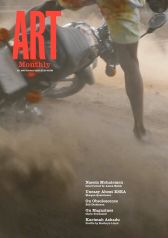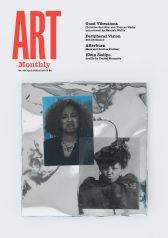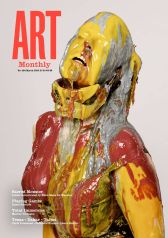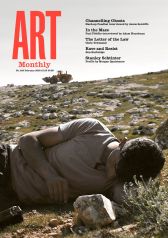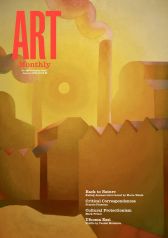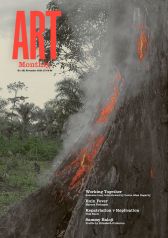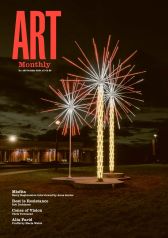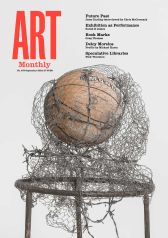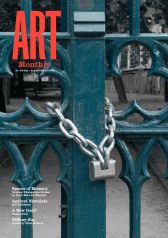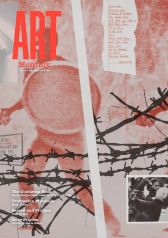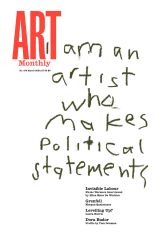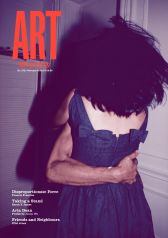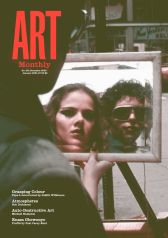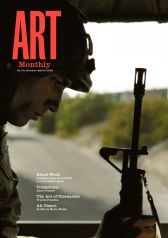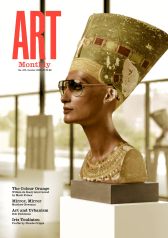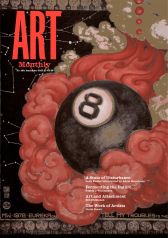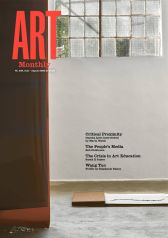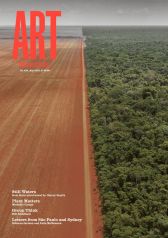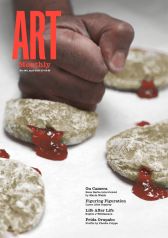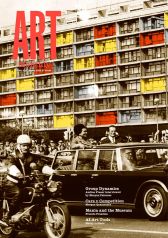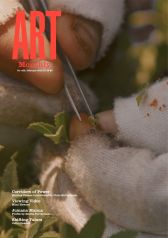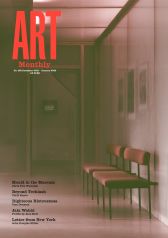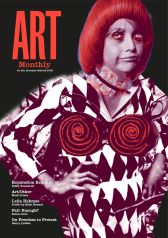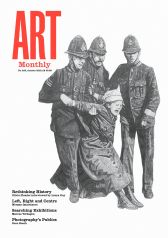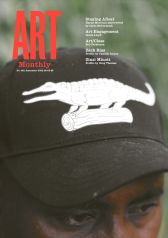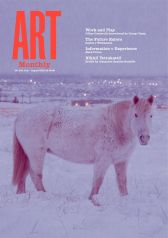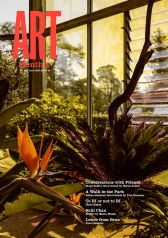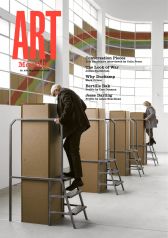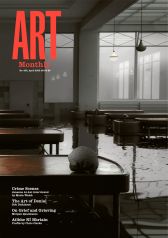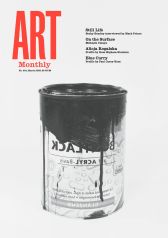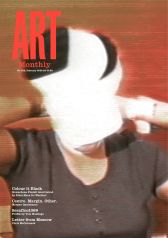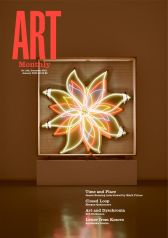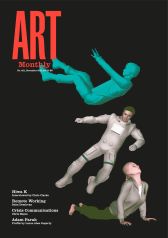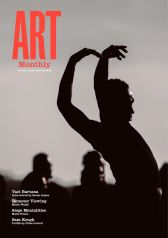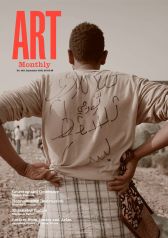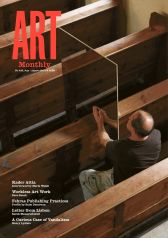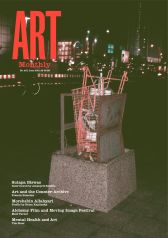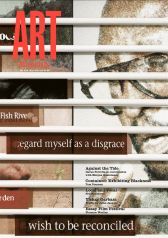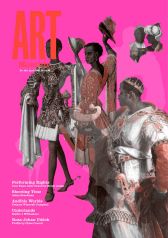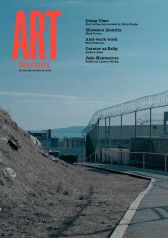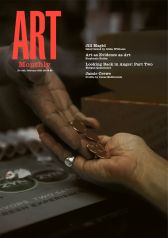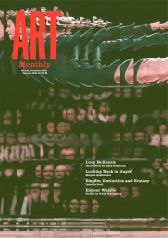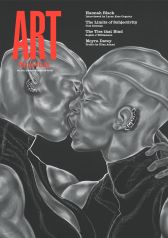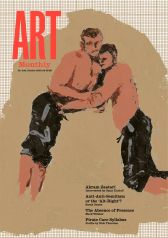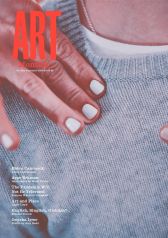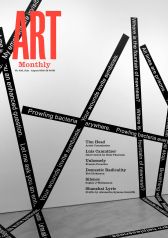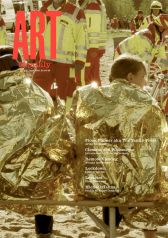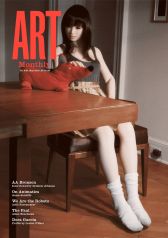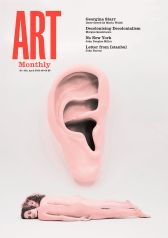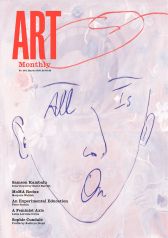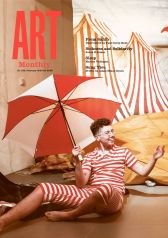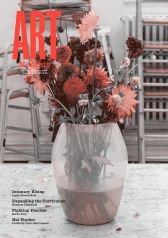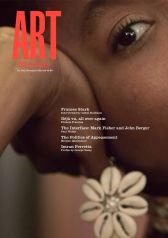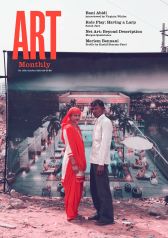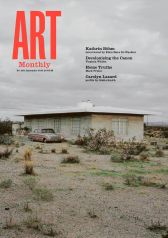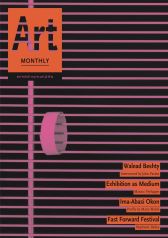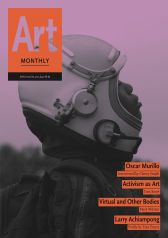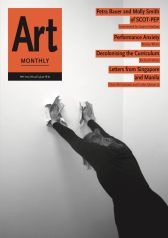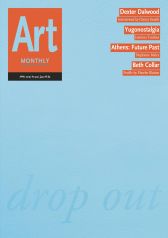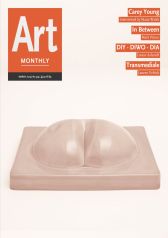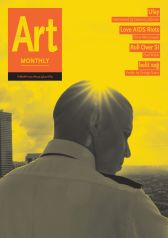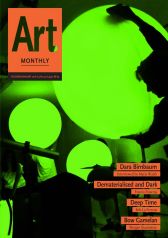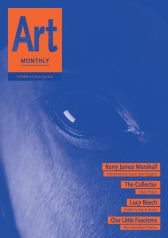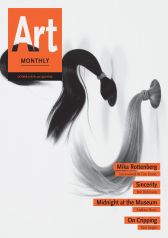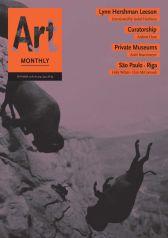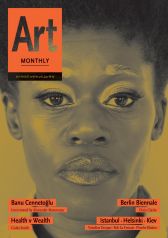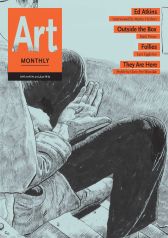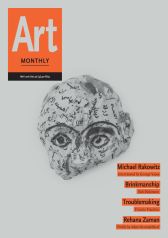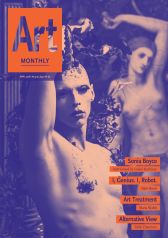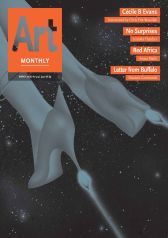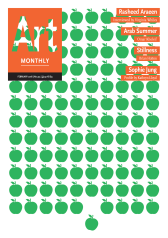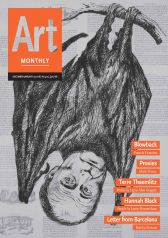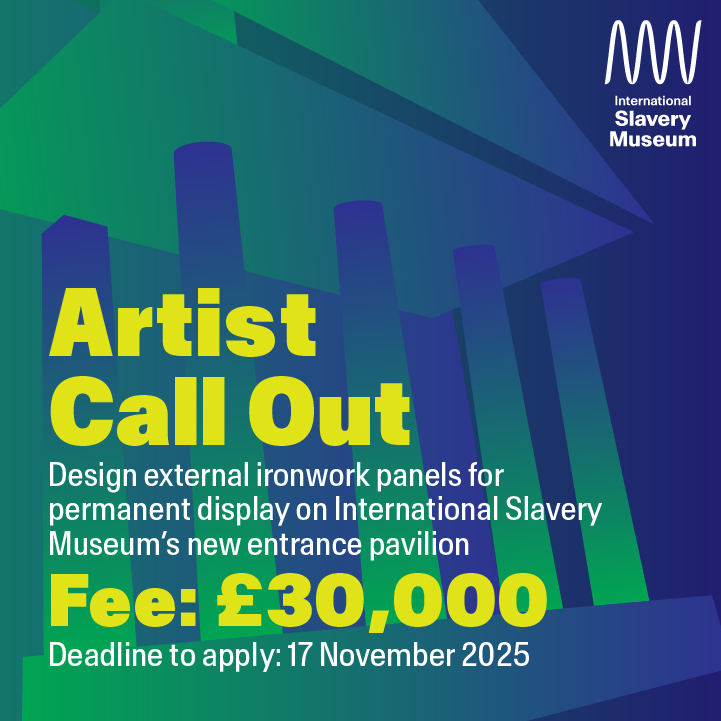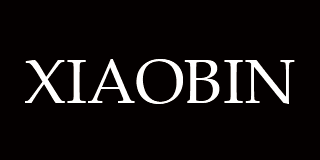Recent Articles
Never Again Peace
Chris Clarke encounters an art festival that accepts war is inevitable
Guillaume Cailleau and Ben Russell: Direct Action
Nicholas Gamso finds inherent tensions in this attempt to document radical activism
Letter from Amman
In Jordan Mark Sheerin encounters softly spoken artworks that nevertheless burn with urgency
Nolan Oswald Dennis: throwers
Amrita Dhallu finds the South African artist’s imaginative history of stone throwing has become a foundation for worldmaking
A World of Water
Maja and Reuben Fowkes feel the urgency of the curator’s question: can the seas survive us?
The Stimming Pool
Maria Walsh surrenders to an experimental film that explores the idea of an ‘autistic camera’
American Fallacy
Chris Townsend reports from Texas on the Myth of the West at a time when California is beset by wildfires
International Documentary Film Festival Amsterdam 2024
Rachel Pronger discovers how the IDFA attempted to recover from the previous year’s calamitous festival
Lauren Halsey: emajendat
Martin Herbert is urged to free his mind
Middlesbrough Art Week
Tom Jeffreys reports on an exemplary critical art festival that supports communities of artists at the grassroots level
Why Surrealism Matters • The medium of Leonora Carrington
Anna Dezeuze argues that Surrealism’s unfettered individual creativity is increasingly vital in an age when alternative worlds are disappearing and imagination is outsourced to machines
Speculative Libraries
Nick Thurston on libraries as artworks
Soumya Sankar Bose: Braiding Dusk and Dawn
Vaishna Surjid is shaken by the artist’s inquiry into his mother’s mysterious three-year disappearance, aged nine, during political crises in West Bengal
Pissed Off
Henry Broome on homelessness, sanitation and public art
Danielle Brathwaite-Shirley: THE REBIRTHING ROOM
Hannah Hutchings-Georgiou on a video-game installation that provides a traumatic but transformative experience
Self-Determination: A Global Perspective
Adam Hines-Green discovers connections in a timely exhibition of art from newly independent nations.
Radical Jewishness
Caspar Heinemann argues that curators have downplayed politics in Nicole Eisenman’s Whitechapel Gallery show
Ali Cherri
Maria Walsh on the Lebanese artist‘s use of dreamlike visions to negotiate conflict
Open City Documentary Festival 2023: The Art of Non-Fiction
Alex Fletcher reports on the contested role of subjectivity in recent documentary filmmaking
Naomi Pearce: Innominate
Jonathan P Watts on the forensic feminist methodology at the heart of an artist studio mystery novel
Artists in a Time of War
Max L Feldman finds that this historical survey exhibition is nevertheless most focused on current events in Ukraine and Afghanistan
Outer Spaces
Greg Thomas reports on the rise of short-let artist-run spaces in Edinburgh city centre
Frida Orupabo
Phoebe Cripps on the Norwegian artist’s use of historical archives to return an unsettling colonial gaze
A Tall Order! Rochdale Art Gallery in the 1980s
Eddie Chambers argues that the contributions of regional public galleries in the 1980s raises questions about their impact today
Class Issues: Art Production In and Out of Precarity
Martin Herbert encounters an all-too-rare exhibition exploring the issue of classism
Roy Claire Potter: Land Lay Moldbrest • David Steans: Mummy Hood Nesting Forest
Jamie Sutcliffe is consumed by two new net art commissions that explore landscape horror through hypertext
The Double: Identity and Difference in Art Since 1900
Richard A Kaye encounters the magic of the double in this inspired exhibition
Array Collective: The Druthaib’s Ball
Joanne Laws decodes the Irish symbolism in Array’s anti-imperialist artwork
Letter from the Hamptons
Daniel Neofetou on an East Coast culture clash
Jitish Kallat: Covering Letter • Tangled Hierarchy
Adam Heardman on Jitish Kallat’s installation and curated exhibition confronting colonialism
59th Venice Biennale: The Milk of Dreams
Chris Clarke finds a parallel timeline revealed
Radio Ballads
Maria Walsh encounters socially engaged artworks in an east London council office and a west London royal park.
Every Ocean Hughes: One Big Bag
Lucia Farinati discovers the importance of death doulas
Andrea Fraser: This meeting is being recorded
Olivia Aherne feels the discomfort in Andrea Fraser’s confrontational anti-racism video installation
Learning to Unlearn
Greg Thomas reports on the Ignorant Art School series of exhibitions
Crip Time
Martin Herbert is challenged by MMK Frankfurt’s ambitious exhibition of disability-related art
Letter from Naples
Mark Sladen encounters a chilling new film in a city where edgy art has long been welcome
Trouble In Outer Heaven: Portable Ops Plus
Martin Herbert stalks through a chilling alternative sci-fi realm that is nevertheless eerily familiar
Tino Sehgal at Blenheim Palace
Adam Heardman witnesses an encounter between relational aesthetics and rarefied pomp
Leah Capaldi: Big Slit
Cherry Smyth finds herself alive in the livefeed
Mental Health and Art
Tim Steer on art projects that reveal the sociopolitical roots of mental-health issues
High Streets for All?
Matthew Noel-Tod on the instrumentalisation of artists by property developers in a time of crisis
Rosa-Johan Uddoh
Chloe Carroll shows that the artist’s background in architecture enables her to interrogate the identarian influence of cultural spaces
Art and Activism in the Age of Systemic Crisis: Aesthetic Resilience
Francis Frascina discovers the limits of this collection of essays focused on art that nurtures change
Dan Hicks: The Brutish Museums
George Vasey on the argument that museums must care for people more than objects
Lottery Lives
Current art-funding schemes, despite their meritocratic veneer, remain incurably unjust. It is time, says Michaële Cutaya, for a radical shake-up.
Park McArthur: Kunsthalle_guests Gaeste.Netz.5456
Mitchell Anderson on embodiment in the US artist’s audio tour of the gallery space
Anti-Anti-Semitism or the ‘Alt-Right’?
Following the controversial special issue of leftist art magazine Texte zur Kunst, Sarah E James asks what happens when anti-anti-Semitism meets the ‘alt-right’
Matt Wolf: Spaceship Earth
Lin Er-Ying on the lessons to be learned from this cautionary tale of Biosphere 2, the spectacular but doomed 1980s ecological experiment
Online Round-up
Lauren Velvick on the variety of approaches, from browser plug-ins to web interruptions, that artists and organisations are using to present art online
Shanzhai Lyric
Alexandra Symons Sutcliffe on the way the New York duo’s work charts the flows of capital that shape our world
Michael Hanna
Maeve Connolly examines the artist‘s interest in time travel, everyday language, patterns and technological utopianism
How to Make Art in a Pandemic?
Khairani Barokka considers ableism in art in the light of the Covid-19 lockdown
Steve McQueen
Adam Hines-Green finds that the Oscar-winning artist is liberated by the limitations of video
Reflections on Education from the Frontlines
Royal College of Art lecturers challenge the business-first approach of British universities and their art departments
Sophie Cundale
Kathryn Lloyd examines the London-based artist’s new work, which takes on Greek mythology, cinema and the world of boxing to address long-term concerns about loss and trauma.
Alex Margo Arden and Caspar Heinemann: The farmyard …
Larne Abse Gogarty finds this exhibition and two-act play to be an antidote to today’s cruel and crass political landscape.
The Found Archive of Hani Jawherieh
Amna Malik explores Void Project’s thoughtful feminisation of contested representations of masculinity through the work of the late Palestinian filmmaker.
Imran Perretta
George Vasey discusses the coercive role of images and hidden racial, social and economic biases of photographic and other technologies, as revealed in the work of the London-based artist.
Andrea Luka Zimmerman and Adrian Jackson: Here For Life
Hettie Judah reviews a collaborative film that follows the lives of Londoners as their city changes around them
Carolyn Lazard
Giulia Smith discusses the Philadelphia-based artist’s political agenda, which centres on changing the institutional treatment of disability rather than merely representing it
Richard Grayson: Possessions_inc.
Jamie Sutcliffe navigates the vortex of superstition and techno-consipiracy in Richard Grayson’s online video series
Letter from Zurich
Aoife Rosenmeyer is peeved by the art market’s framing of older female artists as Cinderellas waiting gratefully to be discovered
Call & Response
Morgan Quaintance takes issue with the political claims made in Stephanie Bailey’s article ‘Athens: Future Past’ and Stephanie Bailey responds
Harry Meadley: But what if we tried?
Tom Emery finds out what happens when a public gallery attempts to exhibit every artwork in its collection at once
Letter from Houston
Astrid Korporaal finds a pioneering spirit full of hope for positive change in a city with a surprisingly rich art heritage
Meiro Koizumi: Battlelands
Amy Luo reviews the Japanese artist’s collaboration with US military veterans
Bow Gamelan Ensemble: Great Noises that Fill the Air
Morgan Quaintance enjoys the artist sound collective as an enthralling reminder of the experimental alternative to cultural conservatism
Letter from Kampala
George Vasey reports on the Ugandan capital’s energetic but under-resourced art scene
Letter from Korea: One Step at a Time
Chris McCormack reports on the Gwangju and Busan biennales at a tentatively hopeful time in Korean politics
Private Museums
Aoife Rosenmeyer on the current boom in private art institutions
Oberhausen: Leaving the Cinema
Adam Pugh uses the 64th Oberhausen International Short Film Festival to show that cinema is essential today, it being one of the few remaining social structures to enable public assembly
Martha Rosler and Hito Steyerl: War Games
Stephanie Schwartz reviews the two-artist show at Switzerland’s Kunstmuseum Basel
Art Investigation
Daniel Neofetou argues that Forensic Architecture’s success in the art world is symptomatic of a broader demotion of art’s capacity for political opposition
Forensic Architecture: Counter Investigations
Maria Walsh reviews the group’s ICA exhibition
School: A Recent History of Self-Organised Art Education
Lauren Houlton reviews Sam Thorne’s survey of independent art schools
Andreas Gursky
Martin Herbert reviews the German photographer’s Hayward Gallery retrospective
Letter from Cairo: The Way Back
Maxa Zoller on Egypt’s post-revolution art scene
Terre Thaemlitz
The Minnesota-born, Kawasaki-based artist, writer, DJ and composer explores gender and systolic systems, and argues against reconciliation
What is Happening?
Laure Genillard asks why won’t more galleries voice the fact that art fairs are rapidly eroding their viability

